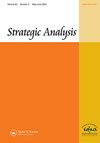Dispatches from the South China Sea: Navigating to Common Ground
IF 0.5
Q3 INTERNATIONAL RELATIONS
引用次数: 1
Abstract
J ames Borton in Dispatches from the South China Sea primarily dwells on the interactions between humans and the environment in the South China Sea. Through his journalistic acumen, Borton intricately embarks upon anthropogenic catastrophes such as coral reef destruction, overfishing, illegal annihilation of sovereign territories, evolving environmental refugee crisis (both forced and motivated environmental migration), over-exploitation of resources by China to mention a few. Therein, Borton dwells on the failures of regional governments (past and present), civil societies, non-government organizations (NGOs), and multinational bodies under the UN. The principle argument underpins how these various stakeholders, driven by their ‘altruistic’ motives and visions, often are the culprits of their own ‘perverted’ visions in praxis. Given the bone-chilling effects of climate change and environmental degradation that every individual living under the sun is experiencing today, makes Borton’s efforts more exemplary, particularly through the Vietnamese case study. The book raises some pertinent questions about the implementation and policies by governments across the global North and South. A key question raised in the book is, do countries in the broader Indo-Pacific region have any multilateral legal instrument in place amidst unbridled Chinese influence to address the question of environmental degradation? And linked to it, is the question of an alternative global environment governance. Further, the book outlines the maritime conflicts emanating from Chinese activities in the South China Sea that can pose an ‘existential threat’ for regional countries in the Indo-Pacific. The current entanglement, rather, stiff tensions which are evident between the US and China on technological, spatial, environmental, economic, social, political and cultural fronts, can only be dealt with an intense, renewed and conscious international collaboration. Borton lays emphasis on letting humanity and science be the guiding force for international collaborations. However, such an approach might only suit the policy-making apparatus of the US. Thus, amidst the ever-evolving geopolitical and geo-economic dynamism in the broader Indo-Pacific, the suggested approach seems only to cater to US and Chinese mutual interests rather than an encompassing thrust towards the global commons. This is likely to incur a backlash, and raise significant questions concerning the North-South divide. However, Borton’s bold gesture of impinging on China’s varied illicit activities in the South China Sea region outlines the current Strategic Analysis, 2022 Vol. 46, No. 5, 551–552, https://doi.org/10.1080/09700161.2022.2115232南海新闻:寻求共同立场
詹姆斯·波顿在《南海快讯》中主要论述了南海人类与环境的相互作用。通过他敏锐的新闻洞察力,波顿错综复杂地开始了人为灾难,如珊瑚礁破坏、过度捕捞、主权领土的非法毁灭、不断演变的环境难民危机(包括被迫和有动机的环境移民)、中国对资源的过度开发等等。在书中,波顿详述了地区政府(过去和现在)、民间社会、非政府组织(ngo)和联合国下属的多国机构的失败。原则论点支持这些不同的利益相关者,在他们的“利他主义”动机和愿景的驱动下,往往是他们自己在实践中“变态”愿景的罪魁祸首。如今,生活在阳光下的每个人都在经历着气候变化和环境退化带来的令人毛骨悚然的影响,这使得博尔顿的努力更具示范性,尤其是通过越南的案例研究。这本书提出了一些有关全球南北政府实施和政策的相关问题。书中提出的一个关键问题是,在中国肆无忌惮的影响下,印度-太平洋地区的国家是否有任何多边法律文书来解决环境退化问题?与此相关的是另一种全球环境治理的问题。此外,这本书还概述了中国在南中国海的活动引发的海上冲突,这些冲突可能对印度太平洋地区的国家构成“生存威胁”。美国和中国在技术、空间、环境、经济、社会、政治和文化方面的紧张关系,只能通过强烈的、更新的、有意识的国际合作来解决。波顿强调让人文和科学成为国际合作的指导力量。然而,这种方法可能只适合美国的决策机构。因此,在更广泛的印度-太平洋地区不断变化的地缘政治和地缘经济活力中,建议的方法似乎只是为了迎合美国和中国的共同利益,而不是对全球公域的全面推动。这很可能招致强烈反对,并引发有关南北分歧的重大问题。然而,博尔顿对中国在南海地区各种非法活动进行冲击的大胆姿态概述了当前的战略分析,2022年第46卷,第5期,551-552,https://doi.org/10.1080/09700161.2022.2115232
本文章由计算机程序翻译,如有差异,请以英文原文为准。
求助全文
约1分钟内获得全文
求助全文

 求助内容:
求助内容: 应助结果提醒方式:
应助结果提醒方式:


